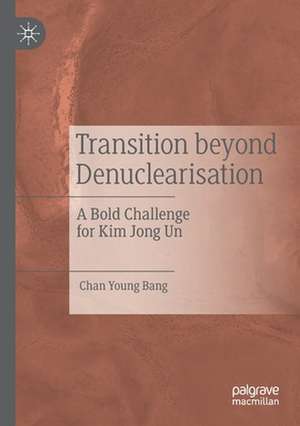Transition beyond Denuclearisation: A Bold Challenge for Kim Jong Un
Autor Chan Young Bangen Limba Engleză Paperback – 30 mai 2021
| Toate formatele și edițiile | Preț | Express |
|---|---|---|
| Paperback (1) | 775.15 lei 6-8 săpt. | |
| Springer Nature Singapore – 30 mai 2021 | 775.15 lei 6-8 săpt. | |
| Hardback (1) | 780.37 lei 6-8 săpt. | |
| Springer Nature Singapore – 30 mai 2020 | 780.37 lei 6-8 săpt. |
Preț: 775.15 lei
Preț vechi: 945.30 lei
-18% Nou
Puncte Express: 1163
Preț estimativ în valută:
148.34€ • 161.08$ • 124.61£
148.34€ • 161.08$ • 124.61£
Carte tipărită la comandă
Livrare economică 23 aprilie-07 mai
Preluare comenzi: 021 569.72.76
Specificații
ISBN-13: 9789811543180
ISBN-10: 9811543186
Pagini: 169
Ilustrații: XIII, 169 p. 2 illus.
Dimensiuni: 148 x 210 mm
Greutate: 0.25 kg
Ediția:1st ed. 2020
Editura: Springer Nature Singapore
Colecția Palgrave Macmillan
Locul publicării:Singapore, Singapore
ISBN-10: 9811543186
Pagini: 169
Ilustrații: XIII, 169 p. 2 illus.
Dimensiuni: 148 x 210 mm
Greutate: 0.25 kg
Ediția:1st ed. 2020
Editura: Springer Nature Singapore
Colecția Palgrave Macmillan
Locul publicării:Singapore, Singapore
Cuprins
1. Introduction.
2. Economic Decay and Failures of Reform in the DPRK.
3. The Collapse Scenario: From Survival to Disintegration.
4. Economic Modernization Beyond Denuclearization.
5. Conclusion.
Notă biografică
Chan Young Bang, PhD, is President of KIMEP University in Almaty, Kazakhstan, and Principal Investigator at the DPRK Strategic Research Center. He is the former economic advisor to the first President of Kazakhstan, Nursultan Nazarbayev, and he has published numerous articles and eight books on the North Korean nuclear conflict.
Textul de pe ultima copertă
"Dr Bang presents a clear and cogent explanation both of the benefits that North Korea could expect from radical economic reform and of the steps that would be needed to achieve this. He does not shrink from describing the very large amounts of money that the international community would need to provide to enable the North Korean economy to grow at 10% a year, the rate that he recommends as a target. The world would be a much safer place if the North Korean elite were to read this book and to take the bold decision to pursue the path that Dr Bang describes."
—John Everard, former ambassador and author of the book, Only Beautiful, Please: A British Diplomat in North Korea
—John Everard, former ambassador and author of the book, Only Beautiful, Please: A British Diplomat in North Korea
This book seeks to go beyond conventional literature on the North Korean nuclear issue by examining the chances of survival of the Kim Jong Un regime, both with and without the nuclear weapons program. It offers a detailed historical background of the dysfunctional North Korean economy, explores the contemporary socioeconomic condition of the country, examines the failures of the Six-party Talks and other attempts at negotiations with North Korea, and outlines a blueprint for the survival of the regime through rapid economic modernization to be put forward by the five stakeholder nations in exchange for dismantlement of the nuclear weapons program.
Chan Young Bang, PhD, is President of KIMEP University in Almaty, Kazakhstan, and Principal Investigator at the DPRK Strategic Research Center. He is the former economic advisor to the first President of Kazakhstan, Nursultan Nazarbayev, and he has published numerous articles and eight books on the North Korean nuclear conflict.
Caracteristici
Examines the chances of survival of the Kim Jong Un regime with and without the nuclear weapons program
Offers a detailed historical background of the dysfunctional North Korean economy
Uses comparative understandings of political transitions in post-Soviet space and provides a practical approach to Korean politics
Offers a detailed historical background of the dysfunctional North Korean economy
Uses comparative understandings of political transitions in post-Soviet space and provides a practical approach to Korean politics
